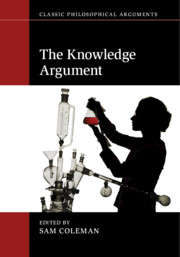Book contents
- The Knowledge Argument
- Classic Philosophical Arguments
- The Knowledge Argument
- Copyright page
- Contents
- Contributors
- Introduction: The Enduring Significance of Jackson’s Knowledge Argument
- 1 The Knowledge Argument Is an Argument about Knowledge
- 2 There’s Nothing about Mary
- 3 Acquaintance, Parsimony, and Epiphenomenalism
- 4 Acquaintance and Phenomenal Concepts
- 5 The Knowledge Argument Meets Representationalism about Colour Experience
- 6 The Mary-Go-Round
- 7 Concept Mastery, Social Externalism, and Mary’s New Knowledge
- 8 Mary’s Powers of Imagination
- 9 The Knowledge Argument Is Either Indefensible or Redundant
- 10 Grounding, Analysis, and Russellian Monism
- 11 Phenomenal Knowledge Why: The Explanatory Knowledge Argument against Physicalism
- 12 The Knowledge Argument and the Self
- 13 What Uninformed Mary Can Teach Us
- Bibliography
- Index
2 - There’s Nothing about Mary
Published online by Cambridge University Press: 09 September 2019
- The Knowledge Argument
- Classic Philosophical Arguments
- The Knowledge Argument
- Copyright page
- Contents
- Contributors
- Introduction: The Enduring Significance of Jackson’s Knowledge Argument
- 1 The Knowledge Argument Is an Argument about Knowledge
- 2 There’s Nothing about Mary
- 3 Acquaintance, Parsimony, and Epiphenomenalism
- 4 Acquaintance and Phenomenal Concepts
- 5 The Knowledge Argument Meets Representationalism about Colour Experience
- 6 The Mary-Go-Round
- 7 Concept Mastery, Social Externalism, and Mary’s New Knowledge
- 8 Mary’s Powers of Imagination
- 9 The Knowledge Argument Is Either Indefensible or Redundant
- 10 Grounding, Analysis, and Russellian Monism
- 11 Phenomenal Knowledge Why: The Explanatory Knowledge Argument against Physicalism
- 12 The Knowledge Argument and the Self
- 13 What Uninformed Mary Can Teach Us
- Bibliography
- Index
Summary
Frank Jackson’s (1986) Mary is confined in a room in which the visual stimuli are all grayscale, so that her visual experiences have all been achromatic. Nonetheless, from books and television lectures, she has gotten all factual knowledge one can get from any source that pertains to the having of conscious visual experiences. It could indeed be “everything [factual] there is to know about the physical nature of the world,” based on “completed” science. But, Jackson writes, “[i]t seems … that Mary does not know all there is to know. For when she is let out of the black-and-white room or given a color television, she will learn what it is like to see something red, say” (1986, 291; emphasis Jackson’s).
- Type
- Chapter
- Information
- The Knowledge Argument , pp. 32 - 61Publisher: Cambridge University PressPrint publication year: 2019
- 1
- Cited by

